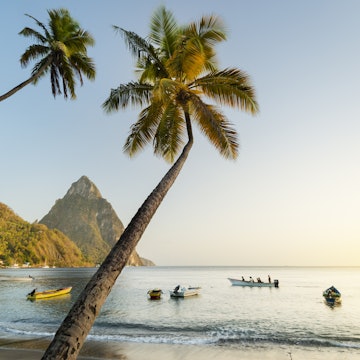

Treehouse accommodations in the middle of a forest in Thailand. fokke baarssen/Shutterstock
The good new is citizens of dozens of countries can enter Thailand visa-free. This makes it one of the easiest countries in Asia to visit impulsively. Some travelers and visitors on longer trips will require a visa, but they're easy and inexpensive to obtain.
There's a lot to see and do in Thailand, and your visa must cover the full period of your stay. Whether you're traveling all over the country on the trip of a lifetime or picking specific places for a tight itinerary, we've got all the information you need to arrive prepared on your trip to Thailand.
Is a visa mandatory for Thailand?
It depends on the passport you’re holding and the purpose of your visit. If you’re coming for tourism and planning to stay for a short time, you’ll most likely be either exempt from a visa entirely or can receive a visa on arrival. In the majority of cases, prior visa application is not mandatory for Thailand.
Entry procedures for tourists to Thailand are very straightforward, whether you arrive by air or overland. Thailand shares land borders with Malaysia, Myanmar, Cambodia and Laos, and many people zip in and out multiple times on a multi-destination trip around Southeast Asia.
Many travelers can arrive in Thailand visa-free; the remainder have to apply for tourist visas. For all visa classes, you need a passport that is valid for at least six months beyond the date of entry, with several spare blank pages. You can be denied entry without proof of an onward ticket and sufficient funds for your stay, but in practice, this is rarely checked. You'll also need to enter an address in Thailand on your arrival card.
The Ministry of Foreign Affairs oversees immigration and visa policies; check the website or contact the nearest Thai embassy or consulate for the current rules. The 'Do I need a tourist visa?' section of Thailand's e-visa website is very helpful for identifying requirements based on your nationality.
Here’s a quick review of Thailand’s different visa options for short-term stays.

Tourist Visa Exemption Scheme
In short, you can enter Thailand without a visa if you qualify based on the conditions outlined in detail below. The border officer will stamp your passport and that entitles you to a stay in the country.
Who can use it: passport holders of 93 countries and territories (including citizens of the USA, UK, Australia and Ireland).
Duration: up to 60 days with the possibility of a 30-day extension
Visa on Arrival (VoA)
VoA is different from the Tourist Visa Exemption program. If you qualify, based on the conditions below, you will have to go to a designated immigration checkpoint at a land or air border crossing and actually apply for the visa. Also, there’s a 2000 Thai Baht (B) fee, payable in cash.
Who can use it: passport holders of 31 countries and territories (including citizens of Mexico, China and India).
Duration of trip: should not exceed 15 days
Let’s go into more detail about the various Thailand visa types to give you a better idea of how the system works.

Visa-free entry to Thailand depends on what passport you hold
Thailand allows visa-free entry for tourists from many countries for stays of up to 60 days. The exact list of countries and permitted durations of stay varies, but it usually includes the US, Canada, the UK, Ireland, most of Europe, Australia, New Zealand, South Africa, and some nations in Asia, South America and the Middle East.
For example, if you’re a US citizen, you’re automatically entitled to a Tourist Visa Exemption and don’t need to obtain a visa before arriving in Thailand. The border officer will stamp your passport at the airport’s immigration and customs checkpoint. Also, your fingerprints will be scanned and a photo taken. After that, you can stay in Thailand for 60 days with the possibility to extend it for up to 30 days.
Some visitors can get a tourist visa on arrival (VoA)
Citizens of some smaller European countries and a handful of destinations in Asia can get a tourist visa on arrival (VoA) for stays of 15 days.
There are desks handling the paperwork at more than 30 airports and land border crossings. You'll need a recent passport photo, proof of funds to support yourself and tickets for onward travel within 15 days, and the 2000B fee in cash.

If you need a tourist visa, get it before you travel
If you are not eligible for visa-free travel or a VoA, you will need to apply for a tourist visa ahead of your visit. It allows a stay of up to 60 days at a time and is valid for three or six months. Fees and conditions vary; contact your local Thai embassy or consulate for the latest rules.
The Thai government's e-visa process makes applying online a possibility for eligible nationalities. Use the Q&A form to understand if this process is open to you. If it is, you can create an online account and follow the steps to provide all the requested information digitally, paying the application fee ahead of processing. If your application is successful, a confirmation email will be sent to you, which you should print out and show to airline or immigration officials when traveling to Thailand.
Education visas are available for those going to study
Thousands of travelers visit Thailand yearly for long-term diving training, meditation study, Muay Thai courses, language lessons and more. If that's you, you can apply for an education visa. Check out all the instances when you can get the ED visa on the official Thai E-Visa portal.
You'll need a letter of acceptance from an accredited education institution showing proof of enrollment on a course, and your passport should be valid for at least six months past the end of the course. The single-entry visas are valid for three months. An extension of the ED visa is possible but only at the discretion of the immigration officer.

Does Thailand have a digital nomad visa?
After years of weighing the idea of a digital nomad visa, Thailand finally introduced it in 2024. Called Destination Thailand Visa (DTV), it gives its holder the right to stay in a country for 5 years with multiple entries. However, it’s essential to understand that this kind of visa doesn’t mean permanent residence. The duration of the stay is limited to 180 days, total, with a possibility to extend it for another 180 days.
In other words, the visa is valid for 5 years, but you can only be a maximum of 360 days in Thailand during that period. It is reserved for freelancers and participants of so-called “soft power-related activities” (like Muay Thai courses, Thai cooking classes, etc.). Check out the full list on the visa application website. The cost of DTV is 10,000B, and it can be obtained both from Thai embassies and online.
What is a Thailand long-term resident visa (LTR)?
Thailand has a special visa for the so-called “high-potential” individuals. It is called LTR (long-term resident) visa, and it’s mostly geared towards investors and high-earning individuals. Applicants must pay a processing fee of 50,000B and show proof of earning US$80,000 per year (or at least US$40,000 per year if they can meet other requirements, such as having a master's degree). They also need insurance covering US$50,000 and must work in a legally registered company that has an income of no less than US$150 million within the past three years. If granted, it allows for a stay of up to 10 years for skilled professionals who wish to work from Thailand.

Tourist visas can be extended in Thailand
If you run short on time during your stay, tourist visas can be extended for an additional 30 days at any immigration office in Thailand at the discretion of Thai immigration authorities; the usual fee is 1900B. See the website of the Immigration Bureau for office listings. You can now also apply for an extension to certain visa types online.
If you're applying in person, remember to dress in your best when you visit the office; turning up in threadbare beachwear and thongs is unlikely to reassure the immigration officers that you have funds to support yourself for a longer stay.
For all types of visa extensions, bring two passport-sized photos and photocopies of the photo and visa pages from your passport. Always take care of your visa business yourself; if you go through a third party, you'll pay more, and there's a risk of falling for a scam.
What if I overstay my visa?
If you overstay your visa, the usual penalty is a fine of 500B per day, with a 20,000B limit. Fines must be paid in Thai baht, either at the airport or in advance at an immigration office. Kids under 15 are exempt, and if you've overstayed by only one day or your departure is delayed because of circumstances beyond your control (eg a flight cancellation by the airline), you usually won't get charged.
Overstaying your visa for more than 90 days can negatively affect your future visas to Thailand and can result in an entry ban or, worse, prison. For example, you may be denied a Thailand LTR visa if you have an overstay history.

"The visa run" is still a possibility... twice
Another extremely popular extension-of-stay option for travelers eligible for visa-free entry is simply to cross a land border and re-enter Thailand after a few days. A new visa exemption will be issued upon your return.
This typically works well the first two times, but authorities are becoming increasingly strict towards travelers who try to extend their stay indefinitely by popping over the border multiple times; don't expect to be able to come back in if you've already done it twice, and remember that re-entry is at the discretion of the visa agent.
















